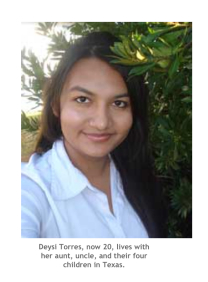|
“There is nothing I can do to help your case.” The immigration attorney barely finished his sentence when the world came crashing down for 16-year-old Deysi Torres. She did not have to speak English to know what he meant—the lawyer’s tone and grim facial expression clearly conveyed the hopelessness of her situation.
Originally from San Alejo, El Salvador, Deysi is one of thousands of people from Latin America who travel thousands of miles in search of a better life in the United States. Roughly five percent of these migrants are underage children like Deysi was when she left her home country. When Deysi was five years old her mother became ill and died. Never having known their father, Deysi and her siblings were raised by their grandparents. Growing up, Deysi had big dreams of becoming a nurse and living with her uncle in America. “I remember always talking to my sister about going to stay with our uncle,” said Deysi, whose aging grandparents did not have the means to provide for their young grandchildren. By the time she turned 16, Deysi was determined to go after those childhood dreams. This meant making the treacherous journey by bus and foot through El Salvador, Guatemala, Mexico, and across the U.S. border to the City of Anna, Texas, where her uncle and his family live. Aware of their limited ability to take care of their grandchildren, Deysi’s grandparents had no choice but to allow her to leave the country in search of a better future in America. For many unaccompanied children, menaced by predatory smugglers and corrupt police, this dangerous journey ends tragically. Thousands are stopped by authorities as they try to cross the North American border and taken to detention centers before being deported. This was the case with Deysi. She had been travelling by bus and foot for close to a month before U.S. Immigration and Customs Enforcement (ICE) officers caught up with her and sent her to an immigration detention center for minors in Miami. “I was so tired from walking for days, I was almost relieved,” she said of the encounter with ICE officers. “I was dirty and stinky. I hadn’t showered in days.” Many child migrants end up spending months in detention centers, tangled up in the bureaucratic legal process. “I was confused and nervous. I didn’t know if the immigration people were good or bad. I didn’t know what to do or think,” said Deysi, recalling the month she spent at a facility in Miami. Fortunately, she was eventually able to stay with her uncle in Texas while awaiting immigration court proceedings. She and her uncle tried everything they could to find a way for her to obtain legal status in the United States—a process made that much more difficult by their inability to speak English. But they had a difficult time finding an attorney to represent them and were continuously told that there was nothing anyone could do to keep Deysi in the United States legally. By a lucky twist of fate (or “God’s hand,” as Deysi put it) she came across a flyer from the National Center for Refugee and Immigrant Children (NCRIC) and called for help. The organization—a division of the U.S. Committee for Refugees and Immigrants (USCRI) dedicated to providing pro bono legal services for unaccompanied immigrant children—assigned Deysi’s case to Dallas-based attorney Oscar Gonzalez. “I took the case after reading news stories about the warehousing of immigrant children,” said Oscar, a founding member of Gonzalez Rolon Valdespino and Rodriguez, LLC (GRVR), a small law firm specializing in international trade. Even though his experience in immigration law was admittedly limited, Oscar signed on to the case because he wanted to ensure that Deysi can remain in the United States with her family. Over the course of three years, Oscar would spend hundreds of hours working on Deysi’s case, guided along the way by NCRIC’s in-house immigration law experts. “The good will created by taking on pro bono projects is much more pronounced in a small firm. It permeates the whole place with a sense of accomplishment, or a feeling that we changed the world positively,” said Oscar. “But there were other angels along the way that helped, including translators, health practitioners, teachers, and school staff.” The hard work paid off: Deysi, now 20, received her green card in October 2009. She continues to live in Texas with her aunt and uncle and their four children. By now she has graduated from high school and speaks fluent English. Deysi is bursting with pride when she talks about her brother back in El Salvador who has recently graduated from college with a degree in engineering. She too is well on her way to making her childhood dreams a reality: she is currently applying to nursing schools. “I still want to be a nurse,” she said. “I like to help people.” Oscar describes Deysi as a quiet young woman with a soft smile and trusting eyes. “Deysi’s gratitude disarmed me and almost brought me to tears after each successive step in her case,” he said. “It is a true honor to be invited to the beginning of this young woman’s life in the United States.”
0 Comments
Leave a Reply. |
Oscar Gonzalez
Principal and a founding member of GRVR Attorneys. Archives
September 2016
Categories
All
|
- Home
- Who we are
-
Our Practice
- Customs and Import
- 301refunds
- Export
- Litigation
- Section 232 and 301 Tariffs
- Outsource Your Classification
- CBP Audits
- Fines, Penalties, Forfeitures, and Seizures
- Customs Brokers
- C-TPAT >
- Foreign-Trade Zones
- Antidumping and Countervailing Duties
- Intellectual Property RIghts
- Foreign Corrupt Practices Act
- Manifest Confidentiality
- Contracts and Incoterms
- False Claims Act and Whistleblower
- Blog
- Resources
- Calendar and Events
- Best Customs Broker Exam Course
- Contact

 RSS Feed
RSS Feed
